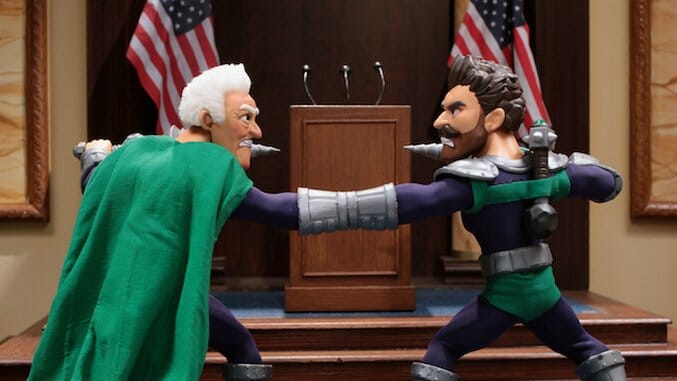An Open Letter to Crackle: Step Up, or Step Out
Photo: Crackle
Dear Crackle,
Not long after your corporate rebranding in 2007, following several years as “Grouper,” you began to show real promise as a programming platform, studio and streaming distributor. As a subsidiary of Sony, your access to a smashing library of evergreen film and TV classics—Seinfeld, The Shield, Eternal Sunshine of the Spotless Mind, Big Daddy—was immediately impressive. Best of all, your services were, at the price of some exhausting commercial breaks, entirely free.
Then, in July 2012, you launched what would become your flagship show: Jerry Seinfeld’s Emmy-nominated Comedians in Cars Getting Coffee, a charmingly intimate short-form series with genre-busting aspirations. An experiment in documentary virality, it features Seinfeld driving funny friends around in luxe vehicles, but it was several degrees more successful than anyone (including the show’s creator) anticipated. With its jollity, narrative simplicity, and consistent chuckleworthiness—not to mention conversations with celebrities like former President Barack Obama and Tina Fey—CiCGC effectively staked your claim as a mini-major in the original content landscape.
Success, of course, has its drawbacks: After clinching more than 100 million views, Seinfeld’s show migrated to Netflix in 2017 for its ninth season, taking the previous eight seasons with it. For a different company, the loss of a whale of that size might simply be humiliating. Unfortunately for you, Crackle, Seinfeld’s departure has left a dangerous, gaping wound.
To your credit, you’ve tried valiantly to leapfrog off that show’s success into original programming, like the stop-motion superhero parody SuperMansion; the recently-renewed Rupert Grint vehicle, Snatch; and the self-promotional highlight clip show This Week On, which debuted in May.
But like a pack of purebred dachshunds with painful back problems, the on-paper pedigree of these series barely conceal their exhaustingly derivative construction, of which SuperMansion is the clearest example.
Despite its recent renewal for a third season, SuperMansion illuminates some of the creative strategies that have left you in a rut. Created by Zeb Wells and Matthew Senreich of the perennially funny Robot Chicken, and executive produced by Bryan Cranston, this must have looked like a home run. After all, it blurs capable stop-motion animation with a take-no-prisoners parody of comic-book mythologies, its obscene super-powered characters voiced by an expert revolving cast including Keegan-Michael Key, Jillian Bell and Chris Pine.
The voice performances, though committed (Pine and Key were both nominated for Emmys in 2016), are not enough to hide the derivative, often puerile material on which SuperMansion depends. In the Avengers-like group in Titanium Rex’s (voiced by Cranston) mansion are two immediately troubling characters: a spiritually confused, stereotype-heavy robot named Jewbot (Zeb Wells) and a humanoid cat called Cooch (played by writer Heidi Gardner) whose grotesque catchphrase is, “Who wants some Cooch?!” And then there’s Rex himself, a sloppy pastiche of Marvel heroics and Trumpian narcissism whose primary nemeses are his erectile dysfunction and an aching back.
As your sole animated original, SuperMansion begs for attention its fart jokes and insipid Mike’s Hard Lemonade product placement can’t sustain. That should not dissuade you from collaborating with Senreich, Wells and company on future projects: Their themed specials for Adult Swim are among the wittiest programming on television. But a series this proudly and brazenly ignorant is bound for ignominy.
Your newest series, This Week On, is off to a similarly shaky start. It features online personalities Ian Hecox and Kevin Mimms spit-balling in two-minute segments (closer to vlogs than episodes) about what they’re “watching” from within the Crackle/Sony catalogue—a sort of weekly welcome for new visitors. The question of whom these episodes are geared to, however, looms large.
This Week On’s unpopularity is astonishing in a world where fidget-spinning dogs get international news coverage. The first episode, “5/4-5/10,” has accrued fewer than 1,300 YouTube views at the time of this writing, at least three of them mine (some episodes have fewer than 1,000 channel views). This makes more sense, however, when one notes the sometimes-offensive commentary Hecox provides, as in his tone-deaf sexualization of Milla Jovovich in an early episode.
-

-

-

-

- Curated Home Page Articles By Test Admin October 21, 2025 | 3:10pm
-

- Curated Home Page Articles By Test Admin October 21, 2025 | 2:57pm
- Urls By Test Admin October 21, 2025 | 2:57pm
- Curated Home Page Articles By Test Admin October 21, 2025 | 2:55pm
-

-

-

-

-

-

-

-

-

-

-

-

-

-

-

-

-

-

-

-

-

-

-

-

-

-

-

-

-

-

-




































